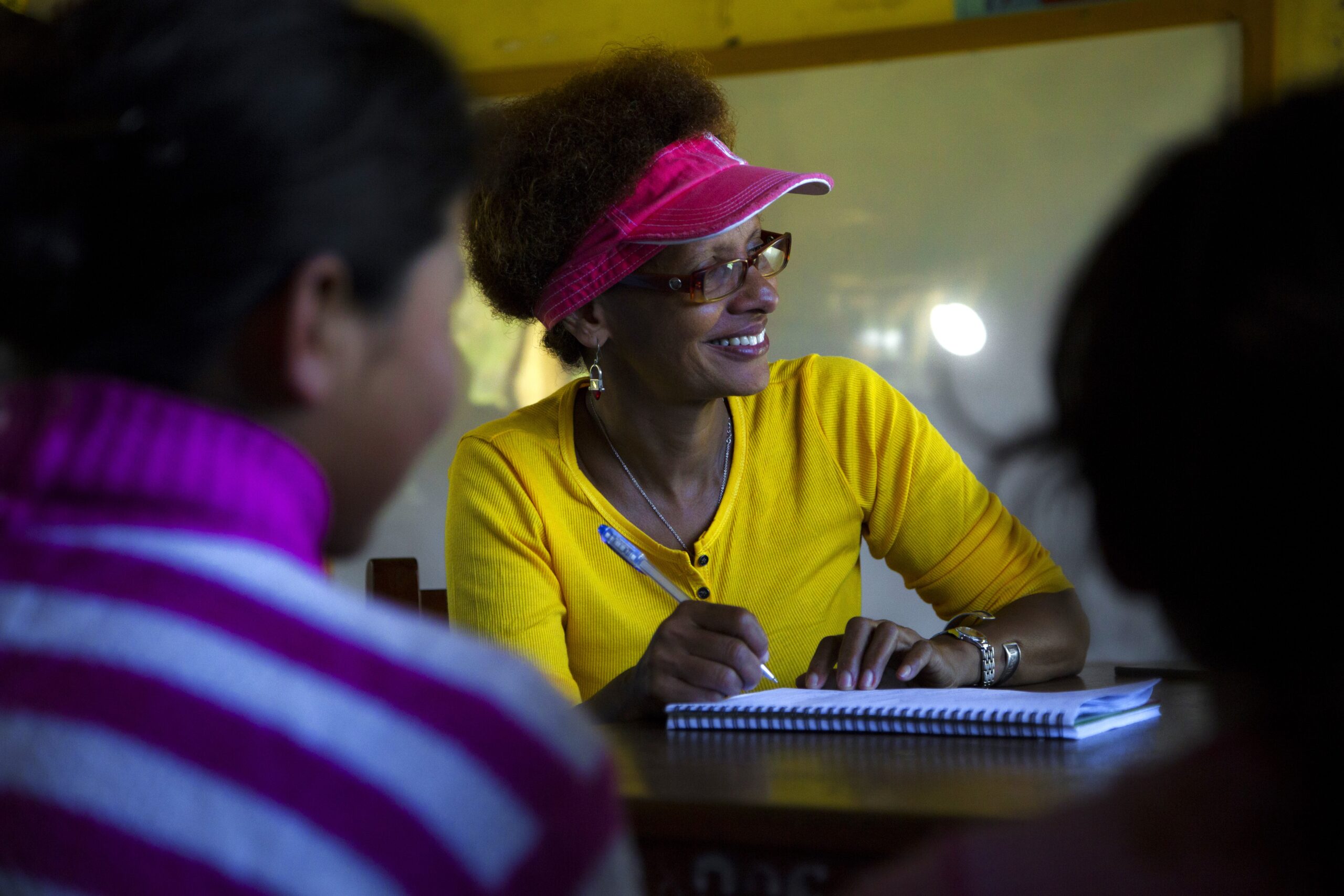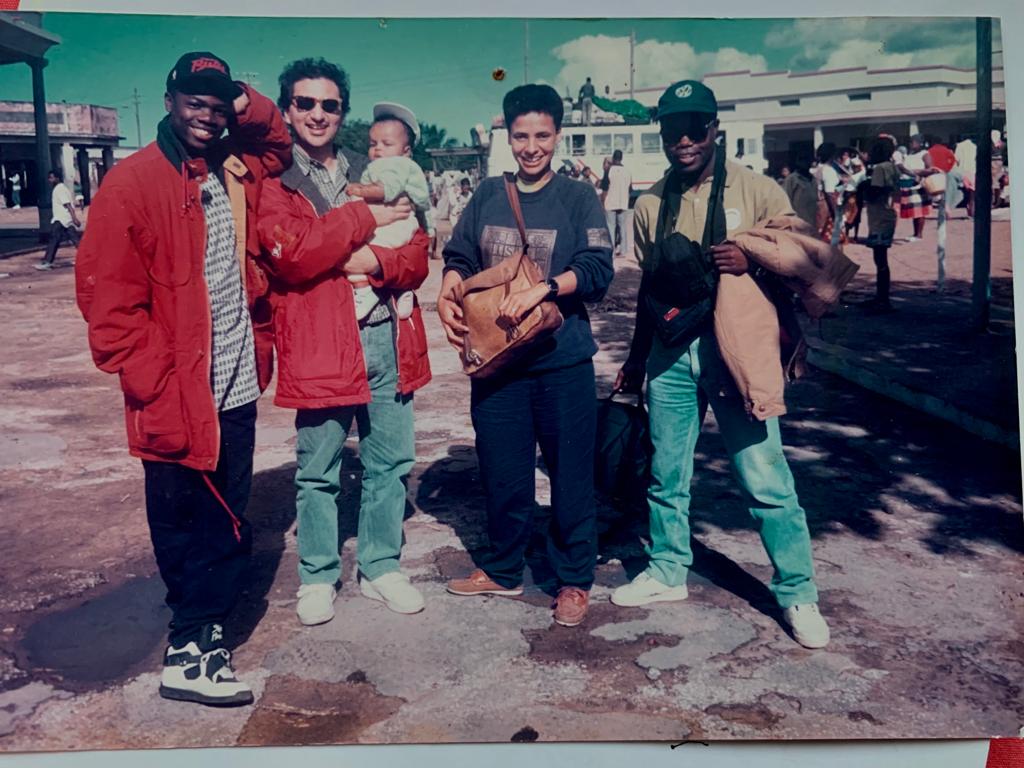Inside AWiM25 at the African Union: Scheherazade Safla on Gender,
Trending
Friday March 6, 2026
Trending

International journalist, communications specialist, editor and Podcaster, Ruth Ayisi takes us through her most incredible experiences being a journalist reporting on conflict in Africa. She also shares with AWiM how one can become a journalist through bold action.
—
When it comes to flying, Ruth Ayisi is a nervous wreck. Her frequent flights are spent hyperventilating and questioning whether the end is near.
From spending over 20 years of her life as an international journalist, she isn’t a newcomer when it comes to flying but the flight attendants never fail to ask the same question: “Is this your first flight?”
Those on the planes with her, are among the few people who get to see Ruth in a state of fear.
When she is in the field, covering stories about African women and girls in the midst of conflict, she isn’t afraid.
Even with her knee-shaking fear of flying, she never lets it affect her job when going to report in situations where most would tremble and flee.
“When my mother was alive and I was away, covering a story during a war that was happening, I spared her the details until I returned,” Says Ruth, “often times, when we hear a scary or an upsetting story, it always sounds twice as scary when we aren’t the ones in it.”
When the Mozambican Civil War was still happening in 1989, Ruth joined a fellow journalist and friend of hers who at the time had moved to the country to cover the war. Both had been working for the Inter Press Service in the UK but decided to fly out to Maputo, the capital of Mozambique as freelance journalists.
In a time of chaos, danger and heartache, the brave reporter was one of the few female reporters there: “Because of the war, there was only a handful of journalists in Mozambique, so I would either travel with male journalists or myself.”
Only a few women were coming in and out of the country which left Ruth not only in a war zone but a male-dominated space.
Fortunately, the journalists and people who surrounded her, made her time in Mozambique unforgettable.
“The first place I went outside of Maputo was the Zambezia provenance, I went there with Action Aid organisation,” Ruth recalls, “When we got there, they introduced me to a man who was managing the house, he was called ‘Senhor Placas’ which means Mr Plates.”
The elderly man was a known great cook in the province and was to be Ruth’s housemate for the time she had in Mozambique. He advised her on how to keep safe and even though they shared a small language barrier as he only spoke in Portuguese, Ruth took it as a chance to learn more of the language and culture for herself.

These were the glimpses of peaceful and joyful moments in a time that was mainly filled with gloom and destruction.
“I stayed there for one week and covered stories I could have never imagined to be true,” the journalist tells us, “I was witnessing all of these families, hundreds and thousands of people that had been displaced to a remote seaside town because their villages and homes had been attacked.”
Working on these stories in her 20’s gave her a new perspective on the experiences different people from different parts of the world endure in life: “Looking back at my career, I think what I have found is that while I have been in very scary situations throughout it, there were always people in much scarier situations.”
One thought that plagued her mind when she was first starting out as a reporter was whether her stories would make a real difference for the individuals and communities, she spoke to, who were facing unspeakable challenges.
“I have realised now that not every story will make a difference but as journalists, we are contributing to that process of change,” the seasoned journalist states.
Advocacy work looking particularly at woman’s rights and gender equality has been a constant source of purpose in the work Ruth has done. Each job opportunity and project she has done has been centred on helping marginalised communities to be heard and seen.
Including her very first gig.
Before taking up journalism, the half-British and Ghanaian activist studied a Psychology degree at Westminster University which used to be called the Polytechnic of Central London at the time. There, she learnt the inner workings of people and the importance of community.
Her first job after graduating was with the Woman’s Peace Bus which was a mobile resource Centre for women supported by the Greater London Council in 1983.
“It was for women who were based in London and living in areas where they didn’t have access to good services,” Ruth adds, “Single mothers and women who wanted to find out about social issues or those needing help, could come to the bus.
During this time, her desire to help and be part of something bigger than herself grew and she joined the Anti-Apartheid Movement (AAM). A British movement that campaigned against Apartheid in Southern Africa to uplift the rights of South Africans and neighbouring countries who had been oppressed and affected by the regime.
One of the people who inspired her to join was her then-roommate, Wiseman Khuzwayo, a South African journalist and a fellow AAM activist.
“He had been detained for a long time in South Africa and was even in solitary confinement before coming to the UK,” shares Ruth, “His story would always touch me but what inspired me most about him was how he used his journalism to share views against oppression and the inequalities happening in the world to bring about change.”
Seeing the power of writing stories for the good of humanity, Ruth decided to leave the Women’s Peace bus and venture into a career in journalism.
“The way I got into journalism was rather unconventional,” she tells us, “I never studied journalism, but I knew I wanted to tell stories.”
The story of Afia Begum, a Bangladeshi woman who had lost her husband in a fire and was to be deported by the Home Office in the UK struck a chord with Ruth.
Campaigns and protests across London in 1984 broke out for the rights of Afia Begum to be heard.
An activist group called the Saree Girls were leading the campaign and took their fight to the European UN Commission of Human Rights to gain more publicity on the case.
Ruth felt she could help spread awareness for the campaign through writing and decided to visit Arif Ali, who at the time was the owner of African Times, Asian Times and Caribbean Times.
“When we met, I told him I want to write this story, and he asked whether I was a journalist,” Ruth remembers, “ I said no, but I want to pursue a career in journalism, and he looked at me amused.”
The Guyanese-born publisher agreed and funded Ruth’s trip to Europe where she joined the Saree Girls on their mission. This was Ruth’s first ever story as a journalist.
“After writing the story, I told Arif how much I wanted to be a journalist despite not having the usual qualifications from university, “ Ruth tells us “To my luck, he told me I could get experience with him and that is how it all started.”
After working at African Times as a journalist she then became an editor: “African Times was a big opportunity because when I became editor, I was sent to press conferences where I met mainstream journalists”.
Feeling like a big fish in a small pond, Ruth made connections with other professionals in the industry. These connections lead to new opportunities that she could have never foreseen.
“A friend of mine recommended me for a coordinator role for an African women feature service for Inter Press Service,” the editor tells us, “the job was to be based in Zimbabwe, so it really was a big opportunity.”
Although Ruth was enjoying her time with African Times and the story she was writing based in London, she took up the job offer and moved to Zimbabwe.
Whilst helping women journalists from Zimbabwe and other African countries like Ethiopia, Nigeria, and Kenya which she also got to visit, the editor advanced in her career as a media trainer working for an organisation called Gender Links and even became a communication specialist for UNICEF.
“For the last eight years now, I have been working with UNICEF, writing stories about the impact of war on children and women and even women’s health,” she explains, “Sometimes the stories I come across can be distressing but writing them down is therapeutic for me.”
For Ruth, there is power in storytelling.
Early this year, the multifaceted journalist started a podcast called ‘Be Inspired’ featuring individuals from creative industries who have overcome obstacles in their lives to achieve greatness.
Throughout Ruth’s career, before landing big and unexpected jobs, she had someone there with her rooting for her and inspiring her to go for it.
“With my move to journalism I had my roommate, Wiseman Khuzwayo encouraged me, then Carl Meyer who took me to Mozambique, then my colleagues who recommended me for the job In Zimbabwe,” she says thinking back.
This time around, it was her handyman and now successful podcaster Daniel Wells who used to paint the walls of her home in the UK.
“He actually studied Fine art at university and one day he told me that he started a podcast and said to me why don’t you,” Ruth shares.
Her passion for storytelling is among many of the things she loves as art is another first love of hers.
Taking advice from her handyman Ruth decided to go for it and continue storytelling in a new way that she could call hers with the occasional help from her son who edits some of the episodes for her.
“I had done interviews for the BBC when I was a freelance journalist in Mozambique and some small packages for Radio Netherlands English service,” the multimedia journalist shares “from there I did grow to love interviewing people through radio and this felt like radio but my radio.”
Taking her listeners through different walks of life from international perspectives that often remain underrepresented, Ruth presents a podcast that acts to inform, connect and most importantly like her own journey…inspire others.
Sometimes it first takes someone to see potential in you for you to see it too and put your dreams into action.
Whether in advocating for what is right or choosing to follow your heart’s desire, take action and be bold in your path of journalism.
This article is part of the African Women in Media (AWIM) Graduate Trainee Programme in collaboration with Fojo Media Institute
We’re not gonna spam. We’ll try at least.

Copyright 2020. African Women In Media
Copyright 2020. African Women In Media
Recent Comments